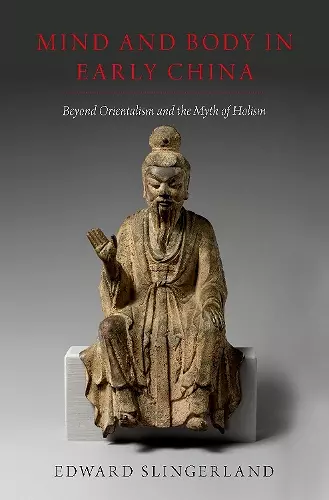Mind and Body in Early China
Beyond Orientalism and the Myth of Holism
Format:Hardback
Publisher:Oxford University Press Inc
Published:28th Feb '19
Currently unavailable, and unfortunately no date known when it will be back

Mind and Body in Early China critiques Orientalist accounts of early China as the radical, "holistic" other. The idea that the early Chinese held the "strong" holist view, seeing no qualitative difference between mind and body, has long been contradicted by traditional archeological and qualitative textual evidence. New digital humanities methods, along with basic knowledge about human cognition, now make this position untenable. A large body of empirical evidence suggests that "weak" mind-body dualism is a psychological universal, and that human sociality would be fundamentally impossible without it. Edward Slingerland argues that the humanities need to move beyond social constructivist views of culture, and embrace instead a view of human cognition and culture that integrates the sciences and the humanities. Our interpretation of texts and artifacts from the past and from other cultures should be constrained by what we know about the species-specific, embodied commonalities shared by all humans. This book also attempts to broaden the scope of humanistic methodologies by employing team-based qualitative coding and computer-aided "distant reading" of texts, while also drawing upon our current best understanding of human cognition to transform our basic starting point. It has implications for anyone interested in comparative religion, early China, cultural studies, digital humanities, or science-humanities integration.
The book should be of interest not only to those who are specialists in East Asian religions or Sinology, but to those as well who want to witness where the humanities-science dialogue usually falters and how the trenches between the two could be charitably buried at last. * Lehel Balogh, Religious Studies Review *
Mind and Body in Early China appropriately subjects to scrutiny claims about holism in early Chinese thought, and encourages us to approach new types of data with open minds... Slingerland's clear and vehement writing style, and the example of his resourcefulness, can surely spark useful conversations—both among Sinologists and between them and scholars in other disciplines. * Hilary Smith, University of Denver, Journal of the American Oriental Society *
All in all,Mind and Body in Early China is a powerful work of original thought and scholarly prowess, and will undoubtedly take its place among the (modern) classics in the field. * Jason Morgan, Reitaku University, Kirk Center *
Over the last two decades, Slingerland has established himself as one of the leading voices calling for a greater integration between the sciences and the humanities, and Mind and Body in Early China is an excellent example of an effective implementation of this aspiration. * Ori Tavor, Journal of the American Academy of Religion *
ISBN: 9780190842307
Dimensions: 236mm x 163mm x 38mm
Weight: 658g
400 pages